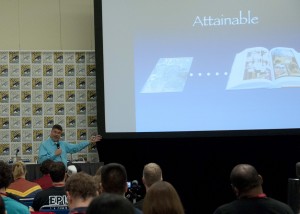
By: Nick Eskey
The thing about fandom is that on some level, we all wish we be a part of what we love: We want to write a hit novel because we love to read; we want to draw a comic book because we love to draw; we want to be a filmmaker because we love to watch movies. But making fantasy a reality is never as easy as the dreaming part. I can personally speak from experience, as that I’ve been trying to finish a manuscript for the last two years. Either there’s always something to keep me from meeting my writing goal, or some maybe an important chore I have to get done first. Sound familiar to you?
Douglass Neff, author of Epic Win! The Geek’s Guide to the Journey from Fan to Creator, treated convention goers to a workshop revolved around completing that certain artistic project we’ve been wanting to complete. Referred cutely as the “10 Magic Coins,” Douglass discussed ten steps of action aimed to facilitate the success of one’s prospective project.
1. “There is no magic.”
Simply put, no one will do the work for us. There are no short cuts we can take, no magic lamps to rub, no secret passage that will lead us to our end goal.
2. “Specific.”
You may know what you want to do, like write a book for example, but there has to be more than that. What type of book? Young adult? Children’s? Murder mystery? Is it going to be one book, or is it going to be a series of books? Douglass used Neil Gaiman’s adaption of Jack Kirby’s Eternals for instance. When Neil Gaiman announced that he was going to do it, he just didn’t leave it at that. He said he was going to do “six” books for the series. If you are planning a project, it should be fully fleshed as to make a clearer goal.
3. “Measurable.”
Though you may not be under any real deadline, you should set one. Having a due date makes the project more real, and gives a new layer of urgency. “I need to get it done by this date, so I should get to work on it.”
4. “Attainable.”
If you want any hope of your goal/project to be realized, the goal itself has to be realistic. Especially if attempting something for the first time, it would be best to make set the end goal to be definitely reachable. If the goal ultimately fails, don’t take it too hard. Failure is a chance to learn. Use what you learned to figure out why it failed, whether the goal was too lofty, or if perhaps the approach wasn’t effective.
5. “Get some help.”
Every great hero either has a sidekick, or has someone in their life that they can depend on to be in their corner. This is their support staff. “It’s too dangerous to go alone. Take this!” A good support team will be needed to stay on track. Your “coach” should be someone who will push you continuously towards your goal. Sometimes, they may even need to pull you along kicking and screaming. Your coach doesn’t care how it gets done, just that it does. Your “cheerleader” will be very important in their own right. When you are at your lowest, they will cheer you own and keep your spirits high. Lastly, your “score keeper” is the one that cares about the quality of your work. “Does that sentence need to be there, why is there a pink elephant dancing on a bar top in this scene, why did you give this woman a mustache?” They are the one that will be brutally honest to you and keep your feet on the ground. Douglass strictly advised that if a spouse fills any of these roles, they should only fill “one” of them. It would be a conflict of interest otherwise. Anyway, more than likely some of your support staff will butt heads with each other. It happens.
6. “One step at a time.”
Along with an ultimate goal, try to create smaller goals that act like waypoints for each step along the way. The process will then seem easier to manage.
7. “Play into your strengths.”
This step should really have a few smaller steps in it, because it covers a number of things. You may not be the best at drawing, but by the gods you are an excellent story teller. Focus on what you’re good at, for these things are what will carry you the farthest. Where you decide to do your work is also going to be a strength. Do you do your best work when alone, or sipping a large-iced-no-fat-soy-latte in a busy coffee shop? How will you do your work also will play a part. Some people are glued to their computers for writing, where others swear by old-fashioned typewriters for their projects. George R.R. Martin for instance writes all his books on an antique dos computer with no internet, or spell checker capabilities. It works for him.
8. “Do your homework.”
A goal requires research. Seems simple enough, but some aspects aren’t always that clear. If you’re trying to sell a script, make sure the people you want to present it to are interested in your genre, or if they are even excepting open submissions at the moment.
9. “Know your nemesis.”
Any proper super hero has that one, really super villain that always manages to be a persistent thorn in their side. Mind you, I’m not saying that you’ll have someone trying to tie your project to the railroad tracks. But there will be things that stand between you and success. Have a habit of searching the web mindlessly on your computer, or easily get tempted away by invites for drinks at the bar? Call out all the things that will impede you, and ensure they won’t get in your way.
10. “Never ever ever give up.”
Now this step is the most important. If you’ve made a real, obtainable goal, then it will eventually be reached. We all know it’s hard to see the trees from the forest, but don’t let the loss of momentum or the fear of failure hold you back. After all, how can you reach your goal when you stop reaching all together?







Comments are closed.